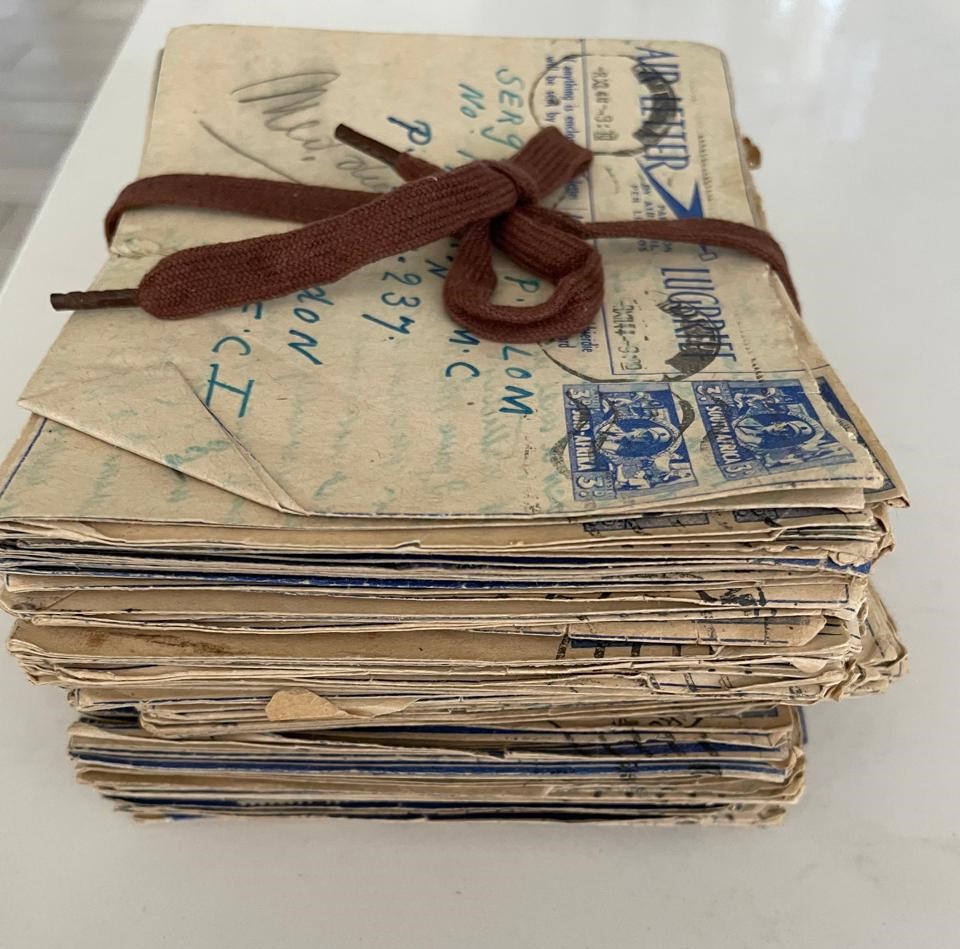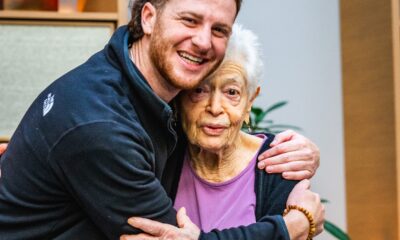
Holocaust

Lost World War II letters finally reach home
A stack of letters, perfectly preserved for more than 80 years since World War II, have finally made their way home after an extraordinary connection made between two Johannesburg Jewish families living just two minutes apart. Twenty-four hours after a Facebook post written just before Shabbat, the letters were in the hands of the recipient’s daughter and granddaughter.
It all started when Heather Superfain, who lives in Johannesburg, was spring cleaning her home at the beginning of June. She came across the stack of letters, tied together with a brown army shoelace, that she had once found in an antique set of drawers that she bought on auction more than 20 years ago. During those two decades, she moved and downsized numerous times, and each time, the letters had come with her.
“Every time, something told me not to throw them away,” says Superfain. “This time, they really were the only thing I still had that could have been thrown out.” Over the years, she had tried to find the family of the author and recipients of the letters, but had no luck.
Now, however, she had the power of social media at her fingertips, and spontaneously penned a post on the Facebook group Joburg Jewish Mommies asking if anyone was related to Philip Brom, the fact that he served in the British army in the 1940s, and that she had old letters of his.
As it was close to Shabbos, Superfain thought few people would see the post. But, nearby in Johannesburg, someone did. “My late grandfather was Philip Blom, not Brom. He was in the British army during World War II. Just checking it’s Brom, not Blom?” responded Jackie Raff.
Superfain realised she had made a mistake, and that the letters were indeed written to Philip Blom. At this point, both women felt excited knowing that this was a real connection. With a simple Facebook post, they had brought the letters home.
“I’m emigrating at the end of July to America,” Raff says. “I’ve been feeling emotional and worrying if I’m making the right decision. I was extremely close to my late grandfather, Philip, whom I called ‘oupa’, as he was Dutch. My oupa, or ‘pups’, and I travelled to America together when I was seven years old. He died shortly after that trip. So, at this big change in my life, I’ve been looking for a sign. Out of the blue, I saw the post. Having the letters is a huge source of comfort. It felt like he was sending me a message that he was still with me and I was doing the right thing.”
“My mind was reeling,” says Superfain. “I thought, ‘How can this be?’ His granddaughter responded so quickly, knowing his story. I knew it was definitely him. This shows how we’re all connected.”
In fact, the families had other connections. Raff’s sister, Karen Fait, a teacher, taught Superfain’s younger daughter many years ago. “And then my older daughter became a teacher and taught with Karen,” says Superfain.
The letters were written between 1943 and 1945 by Blom’s parents, Jules and Julia Blom, to their son when he was stationed in London during World War II as a sergeant major in the medical corps of the Dutch army. Julia wrote in English as she was British, and Jules wrote in Dutch as he was from Amsterdam.
Raff’s mother, Sandra Ellis, says she felt like “this was something from the movies” when her daughter told her the news. “As soon as I saw the letters, I recognised my grandmother’s handwriting,” says Ellis. “It’s been an emotional rollercoaster. Essentially, the letters are typical Jewish parents checking on their son.”
“Philip was born in Amsterdam on 14 May 1916, and died on 13 June 1981. We just marked his yahrzeit, which makes finding these letters so special,” says Raff. “My oupa’s sister, Sarah, was on a ship coming to South Africa during the war. The ship was torpedoed and she was killed. Julia writes about their hope that Sarah is still alive.” Then, in one letter, dated 3 March 1944, Julia writes about her daughter, saying, “I can’t believe I will never see her again.”
Amidst this tragedy, “my grandfather went back to Holland, his home, after the war to check if there were any family members that the Nazis didn’t murder. Remarkably, through the underground, he found out about a cousin of his that had survived. She was a teenager that had been hidden during the war. Her parents were murdered. Her name was Bertie. My oupa found Bertie, brought her from Holland to London and then to South Africa. His parents adopted Bertie.”
Within the letters, Raff found the authorisation that her grandfather had obtained from the Dutch army to bring Bertie on an army plane to South Africa in 1945. “Bertie’s experience was like an Anne Frank story,” says Ellis. “She was hidden by nuns. Her story was recorded by Steven Spielberg’s foundation.
“So, my grandparents lost a daughter and gained a daughter,” says Ellis. After the war, her father met her mother in South Africa, and she and her brother were born. All have since died, so Ellis feels a special responsibility to carry on the family story, and the letters bring that history to the present.
“I even recognise names in the letters of people I met as a young child, all in the diamond industry,” she says. “Back then, people were formal, so they signed the letters ‘Ma and Pa Blom’.”
“My oupa’s family had all been diamond cutters or dealers in Amsterdam since the 16th century,” says Raff. “My dad, Michael Ellis, continues this tradition, as did my mom’s late brother, Alan.”
As soon as they made the connection, the two families arranged to meet on the morning of Sunday, 9 June. But Ellis, Raff, and their families were so excited that eventually, they went to Superfain – who lives just two minutes away – on the evening of Saturday, 8 June, as soon as Shabbos came out.
“It felt like a Shabbat of miracles in light of the rescue of Israeli hostages on the same day,” says Ellis. “We’re so grateful to Heather. She gave our family exactly what we needed at exactly the right time.”
The two families will stay in close contact.
As for what she’ll do with the letters, Raff says, “I’m reading through them and making notes. I’m going to scan them to send to my sister who lives in London and share with cousins. I was thinking of researching the history. I may look into finding Bertie – she married, had children, and lives in America. One day, I would like to share my grandfather’s story and these letters with others from a historical perspective. At the moment, we’re just enjoying the connection to my grandfather. It’s a gift, a miracle, and a blessing!”










